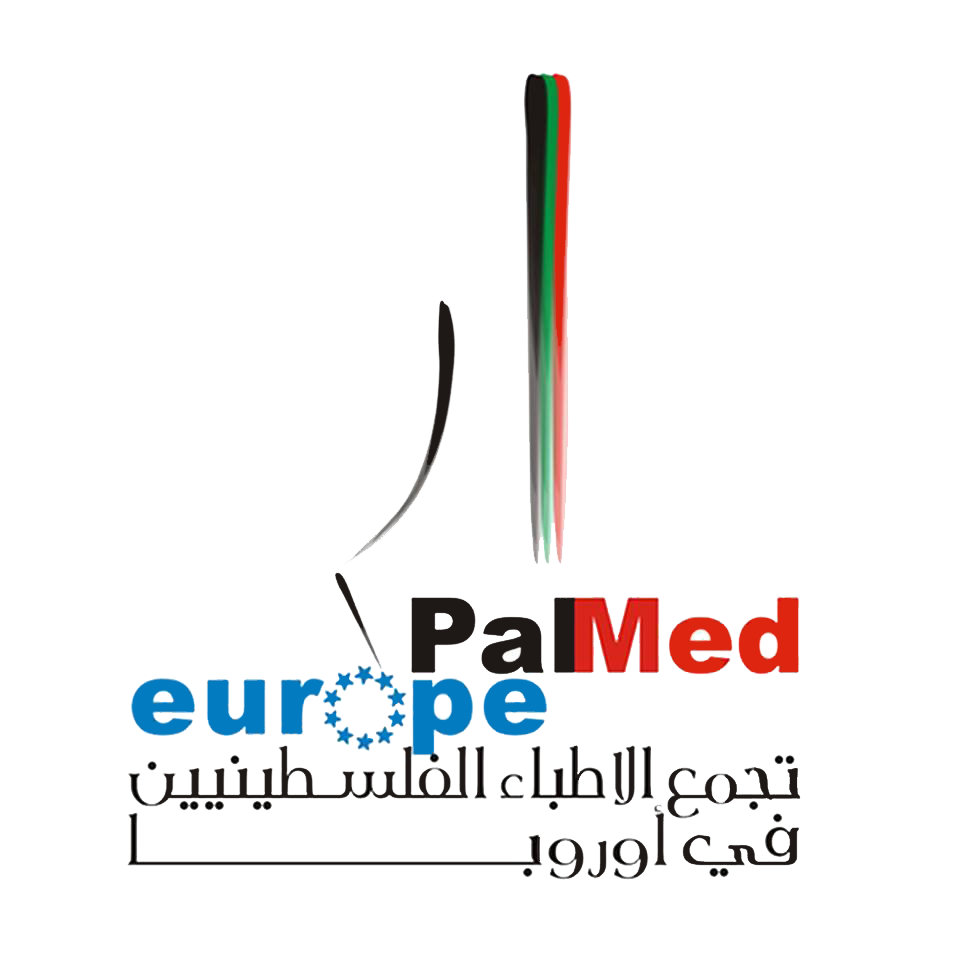Primary Law
- Establishment
- Aims
- Membership
- Structure
- General rules
Article 1: The official title of this organisation is: The Palestinian Doctors
Association in Europe/ UK branch, or ‘PalMed UK’ in short.
Article 2: The association is an independent, non- profit making, non-political medical charity and professional organisation.
Article 3: It has its own emblem which will normally be displayed in its official correspondence.
Article 4: PalMed is responsible for setting up institutions, missions and membership according to its constitution.
Article 5:
A. PalMed is open for all those who fulfil the membership conditions and there is no restriction to holding any other membership of other associations, societies or unions.
B. PalMed rejects the establishment of any political or factional party through its association
Article 6, We aim to:
1. To provide a framework for its members to share their knowledge and expertise for their benefit and to improve the health care for the Palestinian People.
2. To link the universities. Royal colleges and educational institutions in the UK and beyond to those in Palestine, to help in the education and training of health professionals and provide better care for patients.
3. To liaise with governmental and non-governmental organisations and charities working in the field of health to provide the best plans suitable to help the people on the ground.
4. To arrange regular educational and training activities, as well suitable placements, for health professionals in Palestine and the UK.
5. To help its members in the field of professional training, and provide advice and counsel regarding working conditions and opportunities in the UK and elsewhere.
Membership applications are submitted to the membership department of the management committee, which will grant the appropriate type of membership upon its merits.
Article 7: All members are to fulfil the following conditions:
1. To be a graduate of a medical or health faculty.
2. To be a UK citizen or legal resident.
3. To have no criminal record or conviction that hinders the practice of
Medicine in the UK.
4. Completes the membership application form.
5. Accept and abide by the association’s constitution.
Article 8: Membership categories.
A. Full membership: with the right to be nominated and elected to the management committee. This membership entails the payment of an annual subscription.
B. Associate membership: No subscription is needed, the member can attend the general meetings and conferences, without the right to be nominated or elected to the management committee.
C. Honorary membership: This is granted by the trustees for individuals or organisations in recognition of special contributions in the field of health to the Palestinian people, Honorary members do not have to meet any of the usual membership criteria; they are welcome to attend our general meetings and conferences without taking part in the nominations or elections and are exempt from any fees.
Article 9:
The decision for granting, denying or cancelling any membership rests with the management committee and is non-negotiable.
This constitution is to be considered by its members as parallel to the constitution of the mother organisation PalMed Europe.
Article 10: The Board of Trustees:
1. There should be at least three trustees for this organisation.
2. The membership of the Board of Trustees has no time limit,
3. The Board of Trustees is considered the legal and constitutional framework of
PalMed UK
4. Its decisions are made with the majority of two thirds.
5. The Board can add new trustee members, accept members’ resignations or terminate their membership of the board.
Article 11: Conditions of membership to the Board of Trustees
1. Trustee Board members should be full members of PalMed UK
2. Active member for no less than 5 years
3. Held a current or earlier position in the management or consultative committee.
Article 12: Duties of the Board of Trustees
1. The approval and general monitoring of the activities of the management committee.
2. Approval of the plans of the administrative committee in accordance of
Palmed Europe constitution.
3. The power to dissolve the committee in exceptional circumstances if that became necessary to protect the association.
Article 13 &14: Meetings: AGM
1. The management committee calls for a general meeting once a year by inviting the members six weeks in advance; showing the date and location of the meeting.
2. The Annual General Meeting (AGM) is chaired by the committee’s chair or. deputy.
3. The meeting is deemed legal in the presence of a simple majority of full
members. If any number of delegates leave after this point, this does not affect the meeting’s legality.
4. If the delegates attending the AGM are less than half the number of full members, another meeting will be announced to take place no later than three
months hence. The subsequent meeting will be deemed legal regardless of the number of delegates.
5. Resolutions at the AGM are passed by a simple majority of votes by full members. In exceptional circumstances (at the discretion of the management
committee) a majority of two thirds might be necessary.
Article 15: Extra Ordinary General Meeting
1. An extra ordinary general meeting can be called (with two weeks’ notice) in exceptional circumstances by the management committee, or upon a request by two thirds of the full members, presented in writing to the committee’s chair.
2. The meeting will deal only with the matter/s at hand; no other issues will be considered.
Article 16: The Management Committee:
1. The committee plans, keeps and manages projects in accordance with the aims of the association; its members will abide by the association’s constitution.
2. The committee is elected directly by secret ballot for a period of two years.
Nominees will be full members for three years at least. The minimum number of committee members is three, with a maximum of seven, however two more
members can be added by the committee if deemed necessary. The
committee is authorised to establish regulations and to form subcommittees to facilitate the fulfilment of its duties.
3. The committee will meet within a week of its election to allocate the duties to those most suitable, this can be done through a simple election process, or
through consensus.
4. Committee meetings are called by the chair, or upon the request of a majority of its members. The meetings are considered legal by the attendance of a simple
majority of its members; the resolutions are carried by a simple majority as
well.
5. Committee members might be dismissed if they miss three consecutive meetings (or five separate meetings) through no valid reason.
6. The committee can render its resignation through a majority decision, if this happens before the end of its tenure, it will continue as a care taker committee; its chair will call for an extra ordinary general meeting (within one month) to elect a new committee. If this not possible, the Board of Trustees will take over the duties of the committee.
7. If an AGM could not be held to elect a new committee after two years, this can be extended on the authority of the trustees.
Article 17: Finance:
1. The association is funded by its members’ subscriptions, income from events and projects held by the association, unrestricted and unconditioned donations, and funds from charitable organisations.
2. The association holds its transactions through one or more bank account in its name (PalMed UK), and follows the local laws and regulations in all its
financial dealings,
3. All the finances are reviewed and audited annually by a chartered accountant.
Article 18: Dissolution:
1. In order for this organisation to be dissolved, a decision has to be passed by the Board of Trustees with a two thirds majority.
2. Upon its dissolution, all the assets of the organisation are to be transferred to another organisation through a decision by the trustees.
3. Upon its dissolution, no PalMed UK member can deal with its assets or documents without the explicit authorisation of the trustees.
Article 19: Amendment to the Constitution:
1. Requests for any amendment are to be sent in writing to the Board of
Trustees, no later than two months prior to the AGM.
2. The Trustees will consider, and if necessary, suggest amendments to the
Constitution before presenting them to the AGM.
3. Such amendments need to be approved by a two thirds majority of those with full membership attending the AGM.
Article 20: Charters and legal articles:
It is up to the management Committee to issue new charter as and when it finds it fit. It can also set up subcommittees which do not contradict the main constitution.
Number of Articles 20.
PalMed UK, Branch of PalMed Europe


